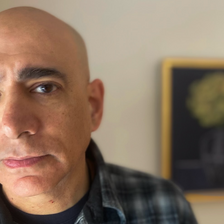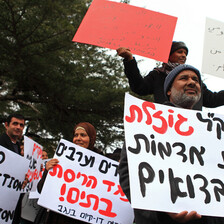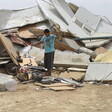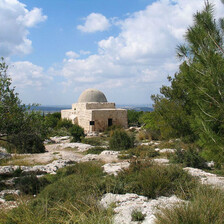The Electronic Intifada London 22 February 2012
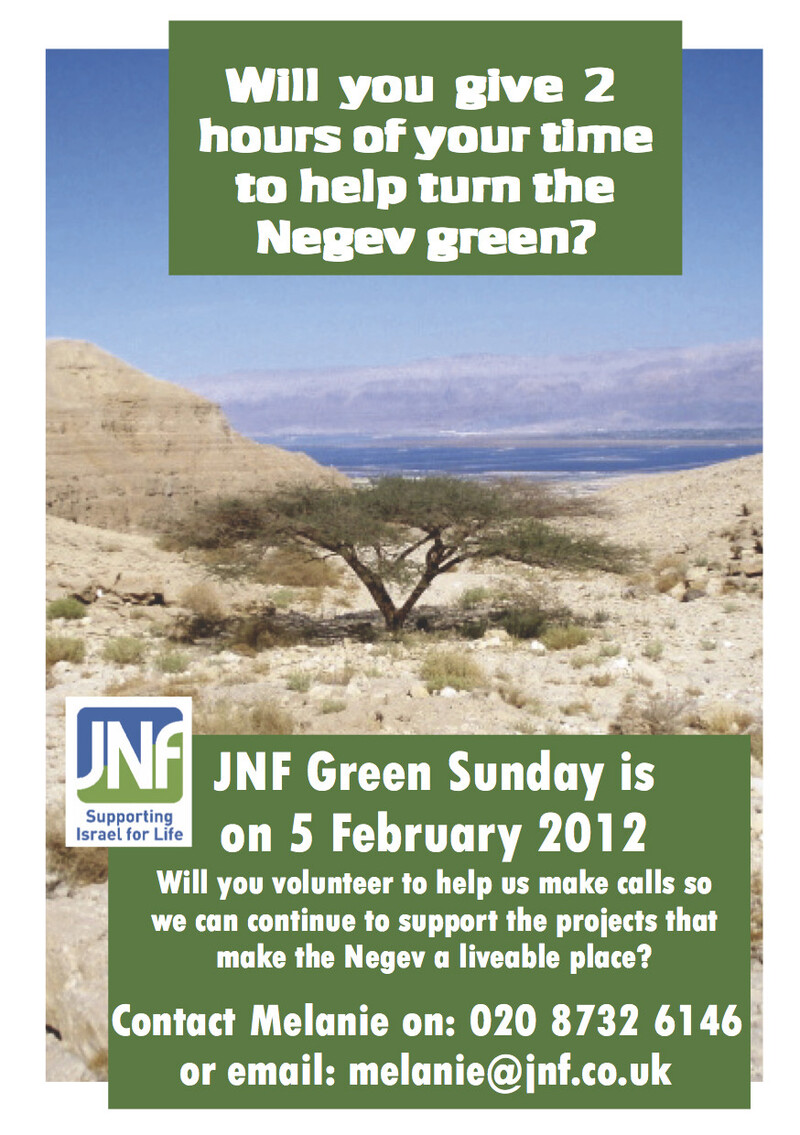
A flyer for a JNF fundraiser in the UK.
Palestinian activists and their supporters have condemned a recent fundraising campaign by the Jewish National Fund (JNF) as a “greenwashing” cover for ethnic cleansing.
The JNF “Green Sunday” fundraiser took place in several countries on 5 February. In publicity materials, JNF UK asked volunteers to “give two hours of your time to help turn the Negev green” and “make the Negev a livable place.”
But Palestinian citizens of Israel who already live in the southern Naqab desert (Negev in Hebrew) say the JNF has a colonialist agenda.
Usama Uqbi, head of the Naqab Bedouin Committee, told The Electronic Intifada that the impression of an empty desert the JNF portrayed was “a big lie.” Palestinian Arabs have been living on their land in the Naqab for hundreds of years, he said. He mocked the JNF flyer giving the impression of an empty land as “empty words.”
The JNF’s real goal is to demolish the homes of Palestinians who already live there, and bring Jewish settlers from the center of Israel to live on the expropriated land, he said.
The Electronic Intifada asked the JNF UK for their response to Uqbi’s criticisms.
A spokesperson replied: “You’re asking do we have a secret agenda to Judaize the desert and steal Palestinian homes?” The word “Judaize” was not used in The Electronic Intifada’s question. He said he would send an official response via email, but failed to follow up on this promise.
The Bedouin in the Naqab
The JNF has been directly implicated in the destruction of Palestinian communities in the Naqab. On 8 March 2011, the Alternative Information Center published a photo of a bulldozer that was involved in one of the destructions of the village of al-Araqib, emblazoned with Israeli and JNF flags (“El Araqib Destroyed for 21st time, JNF Changing Facts on Ground”).
Uqbi said that the Bedouin style of life in the Naqab has been eroded by Israel over the years. Bedouins have been forced to sell their cattle, as Israel has confiscated more and more of their land. The state established seven Bedouin resettlement projects in the Naqab in exchange for abandoning our land, he said. The houses offered in these modern-day reservations are rented, and the Palestinian citizens resettled there are stripped of land rights, he said.
Uqbi himself lives in an “unrecognized village,” which the state refuses to connect to even the most basic public utilities such as water, roads, electricity or schools. Uqbi said this was a deliberate policy to force him to abandon his home.
Sofiah MacLeod from the campaign group Stop the JNF told The Electronic Intifada that Green Sunday was a “propaganda exercise” to cover-up JNF involvement in establishment of “Jewish-only settlements” which are an attempt to “exclude the Palestinian population.”
MacLeod says she visited al-Araqib in December. The now-famous Naqab Bedouin village has been destroyed by the Israelis approximately thirty times since July 2010. Each time the villagers insist on rebuilding.
MacLeod says the villagers were left only with the graveyard in December. Their olive trees have been uprooted and replaced with eucalyptus trees, she says, but despite this, olive tree saplings had started to grow back.
The JNF says it wants to “develop” the area as part of its “Blueprint Negev” initiative.
In a recent press release, the International Jewish Anti-Zionist Network condemned “Green Sunday,” saying the JNF “shamelessly exploits Tu B’shvat [the Jewish holiday that celebrates fruiting trees] as an opportunity to raise money to fund their ongoing colonization of Palestine and displacement of Palestinians … As Jews of conscience, we stand against the ethnic cleansing of Palestine” (“Jewish Call: Stop the JNF - Trees should be sacred, not profane”).
Palestine solidarity groups should start thinking more about the JNF, says MacLeod. A March 2011 parliamentary motion — called an Early Day Motion (EDM) — signed by more than sixty members of British parliament has helped raise awareness, she says. Initiated by left wing Labor Party MP Jeremy Corbyn, the EDM welcomed the Stop the JNF campaign and condemned the JNF for “its ongoing illegal expropriation of Palestinian land” while calling for its charitable status to be revoked (“Early Day Motion 1677”).
Top British politicians desert the the JNF
The EDM also expressed opposition to Prime Minister David Cameron’s status as an honorary JNF patron. In May, Stop the JNF wrote to Cameron asking him to cut his ties. News that the prime minister quietly dropped the charity broke soon after.
Speaking to The Electronic Intifada at the time, a spokesperson for Cameron downplayed the move as “not a particularly recent decision” and that the JNF had been one of a “number of charities” dropped. But in June, this line shifted when a spokesperson told The Jewish Chronicle that the JNF’s ties to Israel had in fact been the issue. The Zionist paper reported the spokesperson as saying it was “nothing to do with a policy issue and was based around the fact he is now prime minister rather than leader of the opposition” (“Cameron’s JNF split: it was Israel,” 2 June 2011).
In a 31 May 2011 letter to The Jerusalem Post, former JNF president Gail Seal wrote that “a British prime minister has been an honorary trustee since” 1901 when the JNF was founded. “How sad it is that, whatever the reason, David Cameron has broken this chain,” she lamented.
Writing in The Jewish Chronicle, JNF Chairman Samuel Hayek criticized Cameron more robustly: “The Prime Minister’s words of support for Israel to Jewish audiences are too often contradicted by those said in front of more hostile crowds. Actions speak louder than words. The decision to resign from JNF has reverberated around the world” (“Why David Cameron - and the community - got it so wrong,” 10 June 2011).
The Liberal Democrat deputy prime minister and the leader of the Labour Party opposition have also declined to become JNF honorary patrons, said MacLeod. Stop the JNF wrote to both Nick Clegg and Ed Miliband asking about the issue and both replied that they had no plans to associate themselves with the JNF, although they gave no reasons, says MacLeod.
Both Scottish Friends of the Earth and the Scottish Green Party have now condemned the JNF and endorsed the campaign against it, says MacLeod. In a statement, The Scottish Greens condemned the JNF “for using the ‘green label to practice crimes against the Palestinian people” (“Scottish Green Party reject ‘green’ claims of charity involved in ethnic cleansing of Palestinians,” 31 October 2011).
MacLeod also says that the Green Party of England and Wales it set to discuss the issue at the upcoming conference.
JNF worried about campaign’s gains
Although parliamentary Early Day Motions are often criticized as impotent, a leaked document shows that JNF chief executive David Goodman is worried about the “legitimacy granted to this campaign by the EDM.” In a December letter sent to most of the MPs signed onto the EDM, Goodman smeared Stop the JNF, asking to meet each MP in private to “discuss the issues.”
Stop the JNF responded to Goodman’s letter by publishing it on their website, refuting its accusations point by point and challenging Goodman to a debate in an “open forum” in Westminster, the seat of the UK parliament (“JNF denies it works to dispossess Palestinians, smears critics,” 2 January 2012).
MacLeod points out that the EDM has yet to lose the signature of a single MP, despite this JNF counter-lobbying.
Goodman’s letter denies treating Palestinian citizens of Israel in a racist way, but admits the “Israeli state has made extensive efforts to encourage the permanent settlement of the Bedouin in recent years” in “additional towns in the Negev to smooth the transition to permanent settlement.”
Future plans
Stop the JNF is optimistic about the future of the campaign, saying in a recent press release that 2012 could be “perhaps its last year holding charity status in the UK” for the JNF.
According to the Charity Commission, the JNF’s last reported annual income was over £12 million ($7.6 million) in the UK alone. Loss of UK charity status would be a massive political blow to Israel as well as a significant financial blow. Registered charities have significant exemptions from UK taxes.
Over the years, many groups and activists have written to the Charity Commission to complain about the JNF, says MacLeod. Through freedom of information requests, Stop the JNF has learned about some of the internal thinking on the issue. The campaign is currently working on putting together a more solid case that it hopes to submit towards the second half of year, she says.
Although the JNF held “Green Sundays” in the UK, France, Australia, the US and Israel this month, there were no public event in the UK, says MacLeod. A few years ago they were very proud to hold public events, even bringing famous names like former US President Bill Clinton and actress Goldie Hawn. But in recent years they are now “on the retreat,” the campaign argues. Their events are held in full or partial secrecy, with publicity often containing vague directions like “London venue” — presumably to throw off potential protests.
MacLeod says the JNF are planning a “charity shoot” event on 11 May, very close to Nakba Day, the annual Palestinian commemoration of the 1948 ethnic cleansing of Palestine. Stop the JNF will protest the Glasgow event and is also holding a conference in Edinburgh on 12 May.
JNF’s long historical connection to Israeli colonialism
The JNF has quasi-governmental status in Israel, and describes itself on its website as “the caretaker of the land of Israel, on behalf of its owners — Jewish people everywhere” (Jewish National Fund, Essence of Life Campaign).
After Israel was established in 1948, the JNF purchased expropriated Palestinian land from the state, and since then has played a key role in an exclusionary land regime that discriminates against Palestinian citizens.
According to Palestinians in Israel: Segregation, Discrimination, and Democracy, a new book by Ben White: “Since 1948, over 700 Jewish communities have been established in Israel’s pre-1967 borders. In the same period, not one new city, town or village for the Palestinian minority has been created, except for seven townships in the Negev intended to ‘concentrate’ the Bedouin population” (p. 38).
In the last accounts and annual report document filed with the Charity Commission (December 2010) JNF UK said it had “supported Israel since 1901, helping to build a country out of nothing” (my emphasis).
This kind of language invokes the old pre-state Zionist slogan “a land without a people for a people without a land,” suggesting the JNF’s agenda in 2012 has changed little since those days.
In his book Expulsion of the Palestinians, Palestinian scholar Nur Masalha wrote of this infamous slogan that it was not intended as a literal demographic assessment: “[Zionists] did not mean that there were no people in Palestine, but that there were no people worth considering within the framework of the notions of European supremacy that then held sway” (p. 6).
In a 2005 US diplomatic cable revealed by WikiLeaks, current Israeli President Shimon Peres is reported as saying Israel had “lost one million dunams [a dunam is the equivalent of 1,000 square meters] of Negev land to the Bedouin” (i.e. supposedly equal Palestinian citizens of Israel). Peres slurred the “Arab sector in both the Negev and the Galilee” as a “demographic threat,” reported the cable (“05TELAVIV1847, Shimon Peres on disengagement, Palestinian social”).
Uqbi emphasized to The Electronic Intifada that Peres went on to play a key role in the confiscation of Palestinian land in the Naqab from his time as development minister between 2006 and 2007.
Asa Winstanley is an investigative journalist who has lived and worked in occupied Palestine. His website is www.winstanleys.org.

